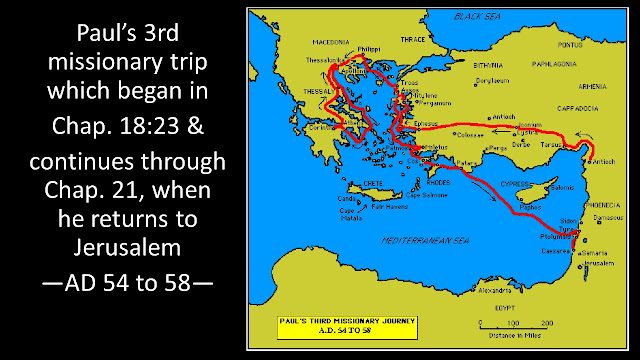In the closing verses of Chap. 17 Paul concludes his stay in Corinth. Opening verses of Chap. 18 we see that Paul left Corinth to go to Athens. This chapter also provides incite into the Greek and Roman world of Paul's day. It presents an opportunity to walk alongside of Paul rather than just reading about his journey.
Don’t just read the words. Think of yourself accompanying Paul through the streets of Corinth. When arriving in Corinth, Paul met Aquila, a native of the Roman province of Pontus, who had previously lived in the City of Rome. The Roman Emperor Claudius drove the Jews out of Rome, with some, like Aquila moving to Corinth. Claudius was Emperor from 41 to 54 AD. He was born in Gaul, the first Roman emperor to be born outside of Italy.
V.1 doesn’t tell us how Paul traveled from Athens to Corinth; if by land or by sea? Either route is probable, by sea would be a lot easier and quicker as we see on the map.
In v.3, we see Paul was a tentmaker by trade, most likely in his hometown of Tarsus. The early church didn’t always have the means to provide for his needs. Often, people outside of the cities lived in tents as shown.
City life was very different. What the city of Corinth looked like at that time. Since most Jews were merchants, we can be fairly certain that the synagogues were not in the poorest sections of town. It’s believed that Paul may have stayed in Corinth longer than any other city. All major Greek and Roman cities included a pagan temple, as shown.
We can only imagine how many of these buildings (replicated via ruins) Paul may have preached in. It was a thoroughly pagan and immoral culture—the degree was evident and the expression to Corinthianize meant to be licentious, or sexually immoral. Think of the challenges Paul faced. The same challenges exist today.
What it looks like today… pagan gods of that period did not survive nor did their temples except as ruins of history past. Past pagan glories “gone!” But new gods of 20th century materialism have replaced them.
It was an intellectual center of learning, with inquisitive minds even in regard to the monument of the UNKNOWN GOD, which made it ripe for the Gospel message.
Corinth was a turning point for Paul. Being a Pharisee, he felt compelled to reach the Jews, but he ran out of patience with the hostile Jews who rejected the Gospel and Jesus as Messiah.
Aphrodite was goddess of love, beauty, pleasure and procreation. The goddess is still alive and well in the world, including the USA. This is what Paul had to contend with in reaching the pagan Gentiles, all of whom had many gods. The message on the slide says it all.
Titius Justus was a Gentile adherent of the Jewish faith at the synagogue and a Roman citizen. Crispus, as synagogue ruler, was responsible for making the arrangements for synagogue worship services, and guest speakers. Picture shows ruins of that synagogue. Those who professed Christ, were saved by faith, and then baptized into the Church.
(Note: Titius Justus is not the Titus Paul wrote his epistle to)
Paul faced strong opposition from both devout Jews and pagan Gentiles. Paul was a Hellenistic Jew, comfortable in the Greek culture and Greek language, sufficiently to write all his epistles (letters) in Greek. In v.9-10 Jesus assures Paul he is safe, not to fret or worry. Is that also a message for us in sharing the Gospel of saving grace with others?
V.13, the Jews pointed to Roman law when condemning Paul—“worship contrary to Roman law”—religion had to be approved by Rome. Judaism was approved and Christ was denounced by the Jews. As in other cities, these Corinthian Jews couldn’t just ignore Paul, but tried to destroy him as a heretic.
Nevertheless, Jewish rage had consequences.
More insight on Sosthenes. Why do we care? Luke, inspired by the Holy Spirit, saw fit to record him here in Acts. Scripture doesn’t explain why Sosthenes was beaten. Other than he was a high-profile Jew who tried to have a Roman citizen condemned—how dare him, from the Roman perspective.
After a long stay in Corinth, Paul leaves for Ephesus, which he did not visit on his first missionary journey. This is the first mention of Ephesus in Acts. Once again, Paul is determined to bring Christ to the Jews. Cut his hair—vow as Nazarite.
After staying several months in Antioch Syria, Paul sets out on his 3rd missionary trip, returning to Galatia and Phrygia to revisit the converts in those areas (noted on map by stars).
Map shows Paul’s travels through Asia, Macedonia and what is now Greece. The extent of Paul’s 3rd missionary journey covers 4 chapters of Acts.
Paul preached Jesus as Lord and Savior in each of the cities noted.
Priscilla & Aquila instructed Apollos with correct doctrine learned from Paul, that they imparted to Apollos. But they did so privately, and not while in the synagogue.
Apollos traveled to Achaia is Greece to profess and defend the Gospel, which brings us to the conclusion of Acts 18. Did you walk with Paul or just read about him?
The Jews rebelled against Paul’s “heretical message” from their perspective—but they failed to recognize Jesus as the promised Messiah. What is the modern Jews’ view of Messiah? O.T. has ended, how do they make restitution and atonement for their sins, especially without sacrifices in the Jerusalem temple? Mostly, not having an answer, they ignore it. Which is equally true of all those who reject Jesus as Savior. They’re too busy with other stuff. But it's the role of the church, as it was with Paul, to keep professing Christ.
Does America need prayer? You bet it does! Does Job 12 describe the current path of America? Without prayer, God will turn away from us as Job tells us. Pray for America.
This prayer was copied from Covenant’s weekly prayer chain, a prayer worth repeating. With God, all things are possible. Don't give up praying for America.
Think in terms of the first century church as revealed in Acts, the heart of which is the Gospel of saving grace through faith in Jesus Christ. We live in a world that has turned away from God. Even some portions of the Church have turned to a social gospel. Jesus sent the apostles to share the gospel with a pagan world, we seem to have returned to that very situation. Share the gospel, perhaps even this lesson, with those who need to know Jesus Christ as Lord and Savior. God bless each of you.
End of
The Acts of the Apostles
Chapter 18

























No comments:
Post a Comment